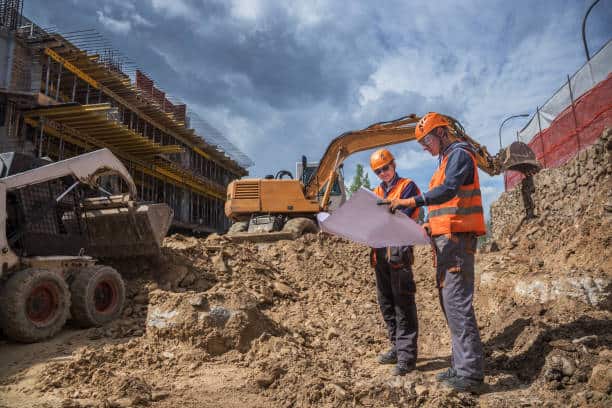Career Opportunities in Civil Engineering
Check out some of the Career Opportunities in Civil Engineering. Also, read through brief descriptions about these careers in this article.
Civil Engineering is a branch of engineering that focuses on the design, implementation, and maintenance of the infrastructure used by humans.
Advertisement
Divisions in civil engineering
- Construction Engineering
- Water Engineering
- Transport Engineering
- Geotechnical Engineering
- Structural Engineering
Career Opportunities in Civil Engineering
There are many careers in the field of civil engineering. However, we are going to explore a few of the careers in this post to gain insight into the careers mentioned below.
- Geotechnical Engineer
- Structural Engineer
- Water Resource Engineer
- Traffic Engineer
- Civil Engineer
- Highway Engineer
- Environmental Engineer
Geotechnical Engineer

Geotechnical engineers are into the study of the geological environment(soil and rocks) and how they can be used to sustain engineering infrastructures and edifices.
Also, check out Career Opportunities in Soil Science.
Advertisement
Roles and Responsibilities of a Geotechnical Engineer
- Accumulate data from offshore travels for analysis
- Enter and cross-check the gathered data for discrepancies or omissions.
- Run calculations and simulations on the collected data
- Make use of technologies and software to process data
- Complete geotechnical analytical work
- maintain spreadsheets, in-house developed tools, and databases
- Ensure compliance with work ethics and standards.
- Prepare geotechnical and foundation reports.
- Use computer-aided tools for drawings and specifications.
- Visit sites to perform reconnaissance, test boring observation, construction monitoring, and soil compaction
- Create and evaluate estimates for the cost of a project,
- Collaborate with the contractors, subcontractors engineers, and personnel actively involved in the project.
- Conduct subsurface soil investigation, laboratory test assignment, and data interpretation.
- Perform slope stability and seepage analysis.
- Assess the conditions of the soil and other factors
Structural Engineer

Structural Engineers are responsible for the design and construction of architectural structures that can withstand stress, pressure, and compression.
They ensure the components, materials, and architectural systems in the building are fit for the building.
Roles and Responsibilities of a Structural Engineer
- Conceive and develop designs used for the selection and processing of the materials used in the architectural design.
- Perform design analysis for conveyors & structures
- Create architectural drawings and blueprints.
- Assist in the budgeting of the materials and equipment used for the building
- Review the drawings and structure and spot any key changes
- Perform structural analysis of components and systems for structures
- Conduct forensic investigations to highlight the key setbacks in the case of accidents Design safety and maintenance systems or make provisions for them.
- Improve existing structural systems in buildings
- Maintain good work relationships and communication with the clients, project engineers, consultants, and other members of the engineering team.
Water Resource Engineer

Water resources engineers specialize in the design and building of infrastructures and facilities that chart the path of water into different homes and places where they are needed.
Some of the structures are used for the preservation and storage of water.
Roles and Responsibilities of Water Resources Engineer
- Design and implement drinkable water, stormwater, and sanitary sewer systems.
- Assist in drafting and developing relevant technical documentation, manuals, and guidelines.
- Handle maintenance and upgrade of the facilities, equipment, and structures.
- Create and manage electronic document file structure, and naming convention by company standards.
- Working closely with Project Managers, Engineers, and Drafters to
- Develop and design construction drawings, schematics, and blueprints.
- Ensure the industry standards and company policies on construction are adhered to.
- Conduct a periodic review to set up changes in the operation.
Traffic Engineer

An aspect of civil engineering that is concerned with the design and implementation of roadways and networks to create an effective and functional transport system.
They do not necessarily build the roads but rather they provide guidance and research and develop the systems that for effective traffic flow.
Also, check out Career Opportunities in Sports Medicine.
Roles and Responsibilities of a Traffic Engineer
- Coordinate significant operational traffic problems and suggest creative fixes. performs the role of project manager on engineering principles and standards.
- Oversee the creation of engineering drawings, specifications,
- Prepare cost estimates and quantity estimates for capital projects related to traffic.
- Conduct thorough traffic effect analysis.
- Prepare presentations, written reports, and other documentation
- Coordinate and collaborate with urban planners and engineers for project review and modifications.
- Respond to complaints, reviews, and suggestions related to traffic issues
Civil Engineer

Civil engineering applies the principles and knowledge from engineering to design, analyze, maintain, and build infrastructures such as dams, bridges, roads, flyovers, canals, and aqueducts.
Roles and Responsibilities of a Civil Engineer
- Create site grading and earthwork plans, rail alignments, flood barriers, drainage systems, and utility systems using the software.
- Utilize hydraulic modeling software to assess and create stormwater, sanitary, and flood-protection systems.
- Research and apply codes, specifications, and standards.
- Collaborate with different members of the engineering team.
- Apply knowledge of the planning, design, and building to each phase of the construction process.
- Investigate the requirements of the regulatory environment for obtaining permission at various project delivery stages.
- Develop designs that address demands and issues in collaboration with project stakeholders and clients.
- Support the creation of specification, computation, and report authoring packages.
Highway Engineer

A highway engineer builds roads especially highways and other road infrastructures such as overpasses, highway ramps, and tunnels.
Roles and Responsibilities of a Highway Engineer
- Inspect bridges and other structures to identify problems with their designs or construction methods
- Determine the best routes for new roads or highways and ensure that their implementation is not endangering.
- Offer recommendations to improve road systems and networks
- Prepare reports and proposals on engineering projects
- Conduct grading and paving operations on the new or damaged roads
- Educate the public about highway projects and how to best maintain them.
- Conduct surveys to help develop the best approach, materials, and equipment suitable for the repair or construction of new roads.
Environmental Engineer

Environmental engineers understand how engineering activities harm the environment and how to prevent or mitigate such occurrences.
Roles and Responsibilities of an Environmental Engineer
- Promote environmentally friendly design initiatives
- Give legal and technical support for environmental cleanup initiatives
- Examine scientific data, do quality assurance checks
- Track the development of efforts to enhance the environment.
- Ensure that organization and the communities conform to environmental laws
- Conduct periodic inspections for proper monitoring of the implications of the activities of the organization.
- Inform businesses and government organizations about how to clean up hazardous sites
Final Notes on Career Opportunities in Civil Engineering
Civil engineering is one of the prestigious fields of study when it comes to engineering. It is subdivided into areas such as water, construction, geotechnical, structural, and transport engineering.
The field of civil engineering is responsible for the infrastructures that benefit and improve the living conditions of humans.
Before you go, check out Career Opportunities in Physiology.







One Comment
Comments are closed.